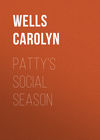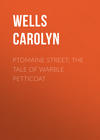Kitabı oku: «The Gold Bag», sayfa 8
XII. LOUIS’S CONFESSION
Elsa had been gone but a few moments when Florence Lloyd returned to the library. I arose to greet her and marvelled at the change which had come over her. Surely here was a girl of a thousand moods. She had left me with an effect of hauteur and disdain; she returned, gentle and charming, almost humble. I could not understand it, and remained standing after she had seated herself, awaiting developments.
“Sit down, Mr. Burroughs,” she said, and her low, sweet voice seemed full of cordial invitation. “I’m afraid I was rude to you, when I went away just now; and I want to say that if I can tell you anything you wish to know, I should be glad to do so.”
I drew up a chair and seated myself near her. My heart was pounding with excitement at this new phase of the girl’s nature. For an instant it seemed as if she must have a personal kindly feeling toward me, and then my reason returned, and with a suddenly falling heart and slowing pulses, I realized that I was a fool, and that after thinking over the disclosures Louis had made, Miss Lloyd had shrewdly concluded it was to her best advantage to curry favor with the detective. This knowledge came to me instinctively, and so I distrusted her gentle voice and winning smile, and hardening my heart against her, I resolved to turn this new mood of hers to my own advantage, and learn what I could while she was willing to converse:
“I’m glad of this opportunity, Miss Lloyd,” I said, “for there are some phases of this affair that I want to discuss with you alone. Let us talk the matter over quietly. It is as well that you should know that there are some doubts felt as to the entire truth of the story you told at the inquest. I do not say this to frighten you,” I added, as the poor girl clasped her hands and gave me a look of dumb alarm; “but, since it is so, I want to do all I can to set the matter right. Do you remember exactly all that took place, to your knowledge, on the night of your uncle’s death?”
“Yes,” she replied, looking more frightened still. It was evident that she knew more than she had yet revealed, but I almost forgot my inquiry, so absorbed was I in watching her lovely face. It was even more exquisite in its terrified pallor than when the fleeting pink showed in her cheeks.
“Then,” I said, “let us go over it. You heard your uncle go out at about eight o’clock and return about nine?”
“Yes, I heard the front door open and close both times.”
“You and Mrs. Pierce being in the music-room, of course. Then, later, you heard a visitor enter, and again you heard him leave?”
“Yes—Mr. Porter.”
“Did you know it was Mr. Porter, at the time he was here?”
“No; I think not. I didn’t think at all who it might be. Uncle Joseph often had men to call in the evening.”
“About what time did Mr. Porter leave?”
“A few minutes before ten. I heard Lambert say, `Good-night, sir,’ as he closed the door after him.”
“And soon after, you and Mrs. Pierce went upstairs?”
“Yes; only a few minutes after.”
“And, later, Mrs. Pierce came to your room?”
“Yes; about half-past ten, I should say; she came to get a book. She didn’t stay two minutes.”
“And after that, you went down-stairs again to speak to your uncle?” For the merest instant Miss Lloyd’s eyes closed and she swayed as if about to faint, but she regained her composure at once, and answered with some asperity,
“I did not. I have told you that I did not leave my room again that night.”
Her dark eyes blazed, her cheeks flushed, and though her full lower lip quivered it was with anger now, not fear.
As I watched her, I wondered how I could have thought her more beautiful when pale. Surely with this glowing color she was at her glorious best.
“Then when did you drop the two rose petals there?” I went on, calmly enough, though my own heart was beating fast.
“I did not drop them. They were left there by some intruder.”
“But, Miss Lloyd,” and I observed her closely, “the petals were from a rose such as those Mr. Hall sent you that evening. The florist assures me there were no more such blossoms in West Sedgwick at that time. The fallen petals, then, were from one of your own roses, or—”
“Or?” asked Miss Lloyd, her hands pressed against the laces at her throbbing bosom. “Or?”
“Or,” I went on, “from a rose worn by some one who had come out from New York on a late train.”
For the moment I chose to ignore Louis’s rose for I wanted to learn anything Miss Lloyd could tell me. And, too, the yellow petals might have fallen from a flower in Hall’s coat after all. I thought it possible by suggesting this idea, to surprise from her some hint as to whether she had any suspicion of him.
She gave a gasp, and, leaning back in her chair, she closed her eyes, as if spent with a useless struggle.
“Wait a moment,” she said, putting out her hand with an imploring gesture. “Wait a moment. Let me think. I will tell you all, but—wait—”
With her eyes still closed, she lay back against the satin chair cushion, and I gazed at her, fascinated.
I knew it! Then and there the knowledge came to me! Not her guilt, not her innocence. The crime seemed far away then, but I knew like a flash not only that I loved this girl, this Florence Lloyd, but that I should never love any one else. It mattered not that she was betrothed to another man; the love that had suddenly sprung to life in my heart was such pure devotion that it asked no return. Guilty or innocent, I loved her. Guilty or innocent, I would clear her; and if the desire of her heart were toward another, she should ever know or suspect my adoration for her.
I gazed at her lovely face, knowing that when her eyes opened I must discreetly turn my glance aside, but blessing every instant of opportunity thus given me.
Her countenance, though troubled and drawn with anxiety, was so pure and sweet that I felt sure of her innocence. But it should be my work to prove that to the world.
Suddenly her eyes flashed open; again her mood had changed.
“Mr. Burroughs,” she said, and there was almost a challenge in her tone, “why do you ask me these things? You are a detective, you are here to find out for yourself, not to ask others to find out. I am innocent of my uncle’s death, of course, but when you cast suspicion on the man to whom I am betrothed, you cannot expect me to help you confirm that suspicion. You have made me think by your remark about a man on a late train that you refer to Mr. Hall. Do you?”
This was a change of base, indeed. I was being questioned instead of doing the catechising myself. Very well; if it were my lady’s will to challenge me, I would meet her on her own ground.
“You took the hint very quickly,” I said. “Had you thought of such a possibility before?”
“No, nor do I now. I will not.” Again she was the offended queen. “But since you have breathed the suggestion, you may not count on any help from me.”
“Could you have helped me otherwise?” I said, detaining her as she swept by.
To this she made no answer, but again her face wore a troubled expression, and as she went slowly from the room, she left me with a strong conviction that she knew far more about Gregory Hall’s connection with the matter than she had told me.
I sat alone for a few moments wondering what I had better do next.
I had about decided to go in search of Parmalee, and talk things over with him, but I thought it would be better to see Louis first, and settle up the matter of his rose more definitely. Accordingly I rang the bell, and when the parlor maid answered it, I asked her to send both Louis and Elsa to me in the library.
I could see at once that these two were not friendly toward each other, and I hoped this fact would aid me in learning the truth from them.
“Now, Louis,” I began, “you may as well tell me the truth about your home coming last Tuesday night. In the first place, you must admit that you were wearing in your coat one of the yellow roses which had been sent to Miss Lloyd.”
“No, no, indeed!” declared Louis, giving Elsa a threatening glance, as if forbidding her to contradict him.
“Nonsense, man,” I said; “don’t stand there and tell useless lies. It will not help you. The best thing you can do for yourself and for all concerned is to tell the truth. And, moreover, if you don’t tell it to me now, you will have to tell it to Mr. Goodrich, later. Elsa gave you a yellow rose and you wore it away that evening when you went to see your young lady. Now what became of that rose?”
“I—I lost it, sir.”
“No, you didn’t lose it. You wore it home again, and when you retired, you threw it on the floor, in your own room.”
“No, sir. You make mistake. I look for him next day in my room, but cannot find him.”
I almost laughed at the man’s ingenuousness. He contradicted his own story so unconsciously, that I began to think he was more of a simpleton than a villain.
“Of course you couldn’t find it,” I informed him, “for it was taken from your room next day; and of course you didn’t look for it until after you had heard yellow roses discussed at the inquest.”
Louis’s easily read face proved my statement correct, but he glowered at Elsa, as he said: “Who take him away? who take my rose from my room.”
“But you denied having a rose, Louis. Now you’re asking who took it away. Once again, let me advise you to tell the truth. You’re not at all successful in telling falsehoods. Now answer me this: When you came home Tuesday night, did you or did you not walk around the house past the office window?”
“No, sir. I walked around the other side. I—”
“Stop, Louis! You’re not telling the truth. You did walk around by the office, and you dropped your transfer there. It never blew all around the house, as you have said it did.”
A look of dogged obstinacy came into the man’s eyes, but he did not look at me. He shifted his gaze uneasily, as he repeated almost in a singsong way, “go round the other side of the house.”
It was a sort of deadlock. Without a witness to the fact, I could not prove that he had gone by the office windows, though I was sure he had.
But help came from an unexpected quarter.
Elsa had been very quiet during the foregoing conversation, but now she spoke up suddenly, and said: “He did go round by the office, Mr. Burroughs, and I saw him.”
I half expected to see Louis turn on the girl in a rage, but the effect of her speech on him was quite the reverse. He almost collapsed; he trembled and turned white, and though he tried to speak, he made no sound. Surely this man was too cowardly for a criminal; but I must learn the secret of his knowledge.
“Tell me about it, Elsa,” I said, quietly.
“I was looking out at my window, sir, at the back of the house; and I saw Louis come around the house, and he came around by the office side.”
“You’re positive of this, Elsa? you would swear to it? Remember, you are making an important assertion.”
“I am telling the truth, sir. I saw him plainly as he came around and entered at the back door.”
“You hear, Louis?” I said sternly. “I believe Elsa’s statement rather than yours, for she tells a straight story, while you are rattled and agitated, and have all the appearance of concealing something.”
Louis looked helpless. He didn’t dare deny Elsa’s story, but he would not confirm it. At last he said, with a glance of hatred at the girl, “Elsa, she tell that story to make the trouble for me.”
There was something in this. Elsa, I knew, was jealous, and her pride had been hurt because Louis had taken the rose she gave him, and then had gone to call on another girl. But I had no reason to doubt Elsa’s statement, and I had every reason to doubt Louis’s. I tried to imagine what Louis’s experience had really been, and it suddenly occurred to me, that though innocent himself of real wrong, he had seen something in the office, or through the office windows that he wished to keep secret. I did not for a moment believe that the man had killed his master, so I concluded he was endeavoring to shield someone else.
“Louis,” I said, suddenly, “I’ll tell you what you did. You went around by the office, you saw a light there late at night, and you naturally looked in. You saw Mr. Crawford there, and he was perhaps already killed. You stepped inside and discovered this, and then you came away, and said nothing about it, lest you yourself be suspected of the crime. Incidentally you dropped two petals from the rose Elsa had given you.”
Louis’s answer to this accusation was a perfect storm of denials, expressed in voluble French and broken English, but all to the effect that it was not true, and that if he had seen his master dead, he would have raised an alarm.
I saw that I had not yet struck the right idea, so I tried again. “Then, Louis, you must have passed the office before Mr. Crawford was killed, which is really more probable. Then as you passed the window, you saw something or someone in the office, and you’re not willing to tell about it. Is this it?”
This again brought forth only incoherent denial, and I could see that the man was becoming so rattled, it was difficult for him to speak clearly, had he desired to do so.
“Elsa,” I said, suddenly, “you took that rose from Louis’s room. What did you do with it?”
“I kept,—I mean, I don’t know what I did with it,” stammered the girl, blushing rosy red, and looking shyly at Louis.
I felt sorry to disclose the poor girl’s little romance, for it was easy enough to see that she was in love with the fickle Frenchman, who evidently did not reciprocate her interest. He looked at her disdainfully, and she presented a pathetic picture of embarrassment.
But the situation was too serious for me to consider Elsa’s sentiments, and I said, rather sternly: “You do know where it is. You preserved that rose as a souvenir. Go at once and fetch it.”
It was a chance shot, for I was not at all certain that she had kept the withered flower, but dominated by my superior will she went away at once. She returned in a moment with the flower.
Although withered, it was still in fairly good condition; quite enough so for me to see at a glance that no petals had been detached from it. The green calyx leaves clung around the bud in such a manner as to prove positively that the unfolding flower had lost no petal. This settled the twelfth rose. Wherever those tell-tale petals had come from, they were not from Louis’s rose. I gave the flower back to Elsa, and I said, “take your flower, my girl, and go away now. I don’t want to question you any more for the present.”
A little bewildered at her sudden dismissal, Elsa went away, and I turned my attention to the Frenchman.
“Louis,” I began, “this must be settled here and now between us. Either you must tell me what I want to know, or you must be taken before the district attorney, and be made to tell him. I have proved to my own satisfaction that the rose petals in the office were not from the flower you wore. Therefore I conclude that you did not go into the office that night, but as you passed the window you did see someone in there with Mr. Crawford. The hour was later than Mr. Porter’s visit, for he had already gone home, and Lambert had locked the front door and gone to bed. You came in later, and what you saw, or whom you saw through the office window so surprised you, or interested you, that you paused to look in, and there you dropped your transfer.”
Though Louis didn’t speak, I could see at once that I was on the right track at last. The man was shielding somebody. He was unwilling to tell what he had seen, lest it inculpate someone. Could it be Gregory Hall? If Hall had come out on a late train, and Louis had seen him there, he might, perhaps under Hall’s coercion, be keeping the fact secret. Again, if a strange woman with the gold bag had been in the office, that also would have attracted Louis’s attention. Again, and here my heart almost stopped beating, could he have seen Florence Lloyd in there? But a second thought put me at ease again. Surely to have seen Florence in there would have been so usual and natural a sight that it could not have caused him anxiety. And yet, again, for him to have seen Florence in her uncle’s office, would have proved to him that the story she told at the inquest was false. I must get out of him the knowledge he possessed, if I had to resort to a sort of third degree. But I might manage it by adroit questioning.
“I quite understand, Louis, that you are shielding some person. But let me tell you that it is useless. It is much wiser for you to tell me all you know, and then I can go to work intelligently to find the man who murdered Mr. Crawford. You want me to find him, do you not?”
Louis seemed to have found his voice again. “Yes, sir, of course he must be found. Of course I want him found,—the miscreant, the villain! but, Mr. Burroughs, sir, what I have see in the office makes nothing to your search. I simply see Mr. Crawford alive and well. And I pass by. That fool girl Elsa, she tell you that I pass by, so I may say so. But I see nothing in the office to alarm me, and if I drop my transfer there, it is but because I think of him as no consequence, and I let him go.”
“Louis,” and I looked him straight in the eye, “all that sounds straightforward and true. But, if you saw nothing in the office to surprise or alarm you, why did you at first deny having passed by the office at all?”
The man had no answer for this. He was not ingenious in inventing falsehood, and he stood looking helpless and despairing. I perceived I should have to go on with my questioning.
“Was it a man or a woman you saw in there with Mr. Crawford?”
“I see nobody, sir, nobody but my master.”
That wouldn’t do, then. As long as I asked him direct questions he could answer falsely. I must trip him up in some roundabout way.
“Yes,” I said pleasantly, “I understand that. And what was Mr. Crawford doing?”
“He sat at his desk;” and Louis spoke slowly, and picked his words with care.
“Was he writing?”
“No; that is, yes, sir, he was writing.”
I now knew he was not writing, for the truth had slipped out before the man could frame up his lie. I believed I was going to learn something at last, if I could make the man tell. Surely the testimony of one who saw Joseph Crawford late that night was of value, and though that testimony was difficult to obtain, it was well worth the effort.
“And was Mr. Hall at his desk also?”
Louis stared at me. “Mr. Hall, he was in New York that night.” This was said so simply and unpremeditatedly, that I was absolutely certain it was not Hall whom Louis had seen there.
“Oh, yes, of course, so he was,” I said lightly; “and Mr. Crawford was writing, was he?”
“Yes, sir,” spoken with the dogged scowl which I was beginning to learn always accompanied Louis’s untruthful statements.
And now I decided to put my worst fear to the test and have it over with. It must be done, and I felt sure I could do it, but oh, how I dreaded it!
“Did Mr. Crawford look up or see you?”
“No, sir.”
“And didn’t Miss Florence see you, either?”
“No, sir.”
It was out. The mere fact that Louis answered that question so calmly and unconsciously proved he was telling the truth. But what a truth! for it told me at the same time that Florence Lloyd was in the office with her uncle, that Louis had seen her, but that she had not seen him. I had learned the truth from my reading of the man’s expression and demeanor, and though it made my heart sink, I didn’t for a moment doubt that it was the truth.
Of course Louis realized the next instant what he had done, and again he began his stammering denials. “Of course, Miss Lloyd do not see me for she is not there. How can she see me, then? I tell you my master was alone!”
Had I been the least uncertain, this would have convinced me that I was right. For Louis’s voice rose almost to a shriek, so angry was he with himself for having made the slip.
“Give it up, Louis,” I said; “you have let out the truth, now be quiet. You couldn’t help it, man, you were bound to trip yourself up sooner or later. You put up a good fight for Miss Florence, and now that I understand why you told your falsehoods, I can’t help admiring your chivalry. You saw Miss Lloyd there that evening, you heard her next day at the inquest deny having been in the office in the evening. So, in a way, it was very commendable on your part to avoid contradicting her testimonies, with your own. But you are not clever enough, Louis, to carry out that deceit to the end. And now that you have admitted that you saw Miss Lloyd there, you can best help her cause, and best help me to help her cause, by telling me all about it. For rest assured, Louis, that I am quite as anxious to prove Miss Lloyd’s innocence as you can possibly be, and the only way to accomplish that end, is to learn as much of the truth as I possibly can. Now, tell me what she was doing.”
“Only talking to her uncle, sir.” Louis had the air of a defeated man. He had tried to shield Miss Lloyd’s name and had failed. Now he spoke sullenly, and as if his whole cause were lost.
“And Mr. Crawford was talking to her?”
“Yes, sir.”
“He was not writing, then?”
“No, sir.”
“Did they seem to be having an amicable conversation?”
Louis hesitated, and his hesitation was sufficient answer.
“Never mind,” I said, “you need not tell me more. In fact, I would prefer to get the rest of the story from Miss Lloyd, herself.”
Louis looked startled. “Don’t tell Miss Lloyd I told you this,” he begged; “I have try very hard not to tell you.”
“I know you tried hard, Louis, not to tell me, and it was not your fault that I wrung the truth from you. I will not tell Miss Lloyd that you told me, unless it should become necessary, and I do not think it will. Go away now, Louis, and do not discuss this matter with anybody at all. And, also, do not think for a moment that you have been disloyal in telling me that you saw Miss Lloyd. As I say, you couldn’t help it. I should simply have kept at you until I made you tell, so you need not blame yourself in the matter at all.”
Louis went away, and though I could see that he believed what I said, he had a dejected air, and I couldn’t help feeling sorry for the man who had so inadvertently given me the knowledge that must be used against the beautiful girl who had herself given untrue testimony.










